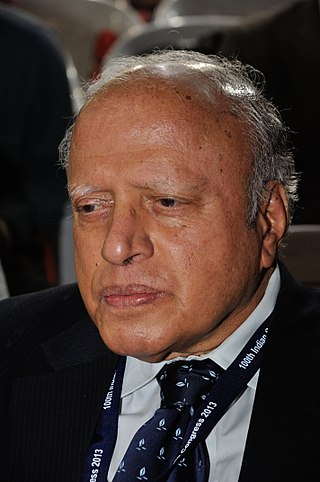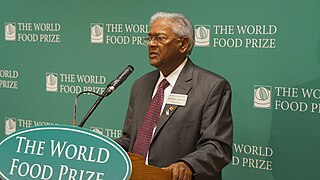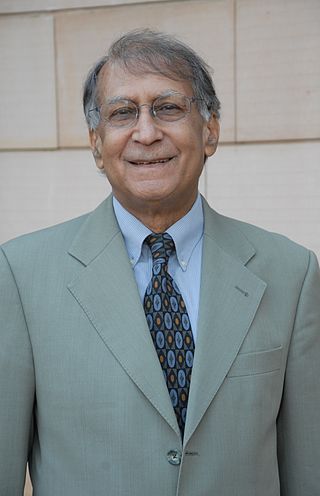
Norman Ernest Borlaug was an American agronomist who led initiatives worldwide that contributed to the extensive increases in agricultural production termed the Green Revolution. Borlaug was awarded multiple honors for his work, including the Nobel Peace Prize, the Presidential Medal of Freedom and the Congressional Gold Medal, one of only seven people to have received all three awards.

Mankombu Sambasivan Swaminathan was an Indian agronomist, agricultural scientist, plant geneticist, administrator, and humanitarian. Swaminathan was a global leader of the green revolution. He has been called the main architect of the green revolution in India for his leadership and role in introducing and further developing high-yielding varieties of wheat and rice. Swaminathan's collaborative scientific efforts with Norman Borlaug, spearheading a mass movement with farmers and other scientists and backed by public policies, saved India and Pakistan from certain famine-like conditions in the 1960s. His leadership as director general of the International Rice Research Institute (IRRI) in the Philippines was instrumental in his being awarded the first World Food Prize in 1987, recognized as one of the highest honours in the field of agriculture. The United Nations Environment Programme has called him "the Father of Economic Ecology". He was recently conferred the Bharat Ratna, the highest civilian award of the Republic of India, in 2024.
Subrahmaniam Nagarajan is an Indian wheat pathologist. He studied in Chennai till high school and completed his early education at the Agriculture College, Coimbatore, then pursued his masters at the Indian Agriculture Research Institute, New Delhi and received his doctorate in Agriculture from the Delhi University. He is the Project Director of the All India Wheat program and author of more than 120 research papers, 50 book chapters and two textbooks.
Mina Swaminathan was an Indian educationist in the field of pre-school education. As a teacher at St. Thomas's School, New Delhi, she developed methods using drama in education and language learning, both inside and outside the classroom. In children's drama, she developed techniques for creative improvisation, and in writing and production of documentary mime plays. Meena Swaminathan was married to Indian Agricultural Scientist, and "Father of Green Revolution" M.S. Swaminathan, whom she met in 1951 while they were both studying at Cambridge.
This page is an index of sustainability articles.

Birla Institute of Technology & Science, Pilani - Dubai is a private technical research university and a constituent college of Dubai International Academic City. It became the international campus of BITS Pilani in 2000, making it the second campus established. It is the first Indian university to have an overseas campus. The institute is backed by the Aditya Birla Group and is one of the first six institutes to be awarded the Institute of Eminence status in 2018.

Birla Institute of Technology and Science, Pilani – Hyderabad Campus is one of the five constituent campuses of the BITS Pilani located in Hyderabad. BITS opened its campus in Hyderabad upon invitation by the Government of Andhra Pradesh in 2008 with the first batch of campus graduating in 2012. It is a technical and research institute with focus on Engineering and Sciences.

M. K. Prasad was an Indian environmentalist known for his grassroots level activism to protect tropical rainforests in the Indian state of Kerala. In the late 1970s, as a member of Kerala Sasthra Sahithya Parishad, he led the Save Silent Valley movement, to prevent development of a hydroelectric project in the Silent Valley National Park, a project that would have flooded the rainforest.

Birla Institute of Technology & Science, Pilani is a deemed university in Pilani, Rajasthan, India. It focuses primarily on higher education and research in engineering and sciences. BITS Pilani is one of the first six institutes in India to be granted Institute of Eminence status. According to 2012 data, BITS Pilani has an acceptance rate of 1.47%, making it one of the most exclusive technical universities in the world.
The Blue Planet Prize recognises outstanding efforts in scientific research or applications of science that contribute to solving global environmental problems. The prize was created by the Asahi Glass Foundation in 1992, the year of the Rio Earth Summit, and since then the foundation has awarded the prize to two winners every year. In 2012, twenty of the Blue Planet Prize winners collaborated on a joint paper that was launched at the UN Environment Programme's Governing Council meeting in Nairobi on 20 February.

SBI Youth for India (SBI YFI) is an Indian rural fellowship programme initiated, funded and managed by the State Bank of India (SBI) in partnership with non-governmental organizations (NGOs). Fellows work with the NGOs on grassroot development projects.
The National Commission on Farmers (NCF) is an Indian commission constituted on 18 November 2004 under the chairmanship of Professor M.S. Swaminathan to address the nationwide calamity of farmers suicides in India. The Terms of Reference reflected the priorities listed in the Common Minimum Programme. The NCF submitted four reports in December 2004, August 2005, December 2005 and April 2006 respectively. The fifth and final report was submitted on 4 October 2006. The reports contain suggestions to achieve the goal of "faster and more inclusive growth" as envisaged in the Approach to 11th Five Year Plan and are collectively termed the M.S. Swaminathan report for farmers
Goverdhan Mehta FNA, FASc, FTWAS, FRS, FRSC is an Indian researcher and scientist.

Ajay Kumar Parida was an Indian biologist noted for his contributions in the fields of agriculture, plant molecular biology and biotechnology. In 2014, Parida was awarded the Padma Shri Award by the President of India for his contribution in the field of Science and Technology.

Dr. Sanjaya Rajaram was an Indian-born Mexican scientist and winner of the 2014 World Food Prize. He was awarded this prize for his scientific research in developing 480 wheat varieties that have been released in 51 countries. This innovation has led to an increase in world wheat production – by more than 200 million tons – building upon the successes of the Green Revolution. The Government of India awarded him India's fourth- and third-highest civilian awards Padma Shri (2001) and Padma Bhushan (2022).
Virander Singh Chauhan is an Indian scientist and a Rhodes Scholar working in the fields of genetic engineering and biotechnology. He is known for his contributions to the development of a recombinant vaccine for malaria. and for synthetic structural peptides with biological functions. He was honored by the Government of India in 2012 with the fourth highest Indian civilian award of Padma Shri. He is the present Chancellor of the Gandhi Institute of Technology and Management.
Dorairajan Balasubramanian, popularly known as Professor Balu, is an Indian biophysical chemist and ocular biochemist. He is a former President of Indian Academy of Sciences and a director of research at the Prof. Brien Holden Eye Research Centre of L. V. Prasad Eye Institute, Hyderabad. A recipient of the National Order of Merit (France), Balasubramanian was honored by the Government of India, in 2002, with the fourth highest Indian civilian award of Padma Shri
Joseph H. Hulse (1923–2013) was a Canadian biochemist, food technologist, writer, and the president of the International Union of Food Science and Technology. He chaired the Committee of the Canadian chapter of the Freedom From Hunger, presided over the Canadian Institute of Food Science and Technology and was the assistant director of nutrition at the Food and Agriculture Organization, besides serving as the vice president of the International Development Research Centre (IDRC). He was the author of several texts and monographs on nutrition and allied sciences, including a 991-page treatise, Sorghum and the Millets: Their Composition and Nutritive Value. The Government of India awarded him the fourth highest civilian honour of the Padma Shri, in 2008, for his contributions to Science and for his humanitarian activities in India.

Gandhakasala rice is a variety of rice cultivated by the farmers in Wayanad District in Kerala. This is a scented variety of rice grown mostly by the members of the tribal communities of in Panamaram, Sultan Bathery, and Mananthavady areas in Wayanad. As of 2010, gandhkasala is cultivated in an area of 327 hectares and jeerakasala in 22 hectares.

Surinder Mohan (Suri) Sehgal is an Indian-American philanthropist with a long career as a crop scientist, seedsman, entrepreneur, and leading global hybrid seed industry expert. His research and professional successes in the areas of plant breeding and genetics, ag biotechnology, intellectual property, business management, and seed industry development were carried out in executive capacities in several companies in the United States, Belgium, and Germany. After the divestment of a group of four seed companies that Sehgal founded and ran with his wife, Edda Sehgal, the couple created two nonprofit organizations to promote rural development in Suri's country of origin: Sehgal (Family) Foundation in 1998 in the US, and S M Sehgal Foundation in India. The foundation focuses on water security, food security, and social justice, particularly empowerment. A proponent of corporate social responsibility and environmental sustainability, Sehgal has also provided support individually and through the foundations for projects related to agriculture research, the preservation of biodiversity and the conservation of natural resources.









